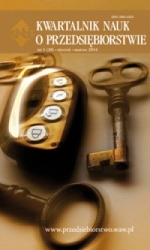Licensure, Ethics, Welfare of the Public and Uberization of Services
Main Article Content
Abstrakt
Artykuł zawiera analizę problemu licencji zawodowych, na przykładzie rynku amerykańskiego. Z jednej strony, licencja powinna być gwarancją odpowiedniej wiedzy i umiejętności wykonawcy usług, ale z drugiej jest problem, jakie kryteria stosować, aby określić odpowiedni ich poziom. Zbyt wysokie wymagania wobec osób świadczących dane usługi mogą prowadzić do ograniczenia konkurencji na rynku pracy, a tym samym do wzrostu cen. Z kolei zbyt liberalne podejście do wydawania licencji może zagrażać dobru publicznemu. Autor omawia ten dylemat w oparciu o doświadczenia różnych rozwiązań stanowych i ich skutków dla rynku.
Downloads
Article Details
Autor (Autorzy) artykułu oświadcza, że przesłane opracowanie nie narusza praw autorskich osób trzecich. Wyraża zgodę na poddanie artykułu procedurze recenzji oraz dokonanie zmian redakcyjnych. Przenosi nieodpłatnie na Oficynę Wydawniczą SGH autorskie prawa majątkowe do utworu na polach eksploatacji wymienionych w art. 50 Ustawy z dnia 4 lutego 1994 r. o prawie autorskim i prawach pokrewnych – pod warunkiem, że praca została zaakceptowana do publikacji i opublikowana.
Oficyna Wydawnicza SGH posiada autorskie prawa majątkowe do wszystkich treści czasopisma. Zamieszczenie tekstu artykuły w repozytorium, na stronie domowej autora lub na innej stronie jest dozwolone o ile nie wiąże się z pozyskiwaniem korzyści majątkowych, a tekst wyposażony będzie w informacje źródłowe (w tym również tytuł, rok, numer i adres internetowy czasopisma).
Osoby zainteresowane komercyjnym wykorzystaniem zawartości czasopisma proszone są o kontakt z Redakcją.
Bibliografia
2. Berry F.S. [1986], State Regulation of Occupations and Professions, The Book of the States, 1986-7,Lexington, Council of State Governments, p. 379-383.
3. BPOA [2015], Bureau of Professional and Occupational Affairs, http://www.dos.pa.gov/ProfessionalLicensing/BoardsCommissions/Pages/default.aspx#.VP3HoPnF_nh, dostęp 12/12/2015.
4. Brannon J.A., et al. [2012], Making the Case for Uniformity in Professional State Licensure Requirements,“International Journal of Telerehabilitation”, Vol. 4, No. 1, Spring.
5. Brous E. [2012], Professional Licensure Protection Strategies, AJN,Vol. 112., No. 12, December.
6. Carpenter Il., et al. [2012], License to Work. A National Study of Burdens from Occupational Licensing,Arlington.,VA, Institute of Justice.
7. Chrzanowski I.H. [2014], Business Ethics and Social Responsibility in the Transition Economies,„Kwartalnik Nauk o Przedsiębiorstwie”, nr 3(32), p. 27-37.
8. Dreyfus H., Dreyfus S. [1991], Towards a Phenomenology of Ethical Expertise, “Humanity Studies”,Vol. 14, p. 229-250.
9. Gapiński A. [n/p], Factors Affecting Decision Making of Licensure Boards: Another Look, not published.
10. Jacobson D. [2005], Seeing by Feeling: Virtues, Skills, and Moral Perception, “Ethical Theory andMoral Practice”, Vol. 8, Spring, p. 387-409.
11. Kleiner M.M. [2015], Reforming Occupational Licensing Policies, The Hamilton Project, BrookingInstitution Discussion Paper-01, January.
12. Kleiner M.M., Kudrie T.R. [1992], Do Tougher Licensing Provisions Limit Occupational Entry? TheCase of Dentistry, Working Paper, No. 3984, February, National Bureau of Economic Research,Cambridge, Massachusetts.
13. Koumenta M., et al. [ 2014], Occupational Regulation in the EU and UK: Prevalence and LabourMarket Impacts, Final Report, Dept. for Business and Management, Queen Mary University ofLondon, London, June.
14. Manjoo F. [2015], Uber’s Business Model Could Change Your Work, “The New York Times”, BusinessDay, January 29.
15. Michels J. [2013], Professional Licensure – It’s Important, IE Industrial Engineer. Member Forum,August.
16. NSPE [2015], The National Society of Professional Engineers, http://www.nspe.org/resources/ethics/code-ethics, dostęp 10/11/2015.
17. Porter E. [2015], Job Licenses in Spotlight as Uber Rises, “The New York Times”, Business Day, January28.
18. Professional Licensing [2015], Pennsylvania Department of State, http://www.portal.state.pa.us/portal/server.pt/community/licensing/12483, January, dostęp 10/12/2015.
19. Schneider S. [1987], Influences on State Professional Licensure Policy, “Public Administration Review”,Vol. 47, No. 6, Nov.-Dec., pp. 479-484.
20. SEC [2015], The Securities and Exchange Commissions, http://www.sec.gov/about/laws.shtml,dostęp 10/10/2015.
21. Smith J.H., Harper P.M., Burgess R.A. (eds) [2008], Engineering Ethics. Concepts, Viewpoints, Cases,and Codes, National Institute for Engineering Ethics, Texas Tech University, Lubbock, 2nd Edition.
22. Stichter M. [2011], Virtues, Skills, and Right Action, “Ethic Theory Moral Practice”, Vol. 14, p. 73-86.
23. Thornton M.A. [2012], Professional Licensure For Software Engineers: An Update, “Education”,September-October, co-published by the IEEE and the AIP.

